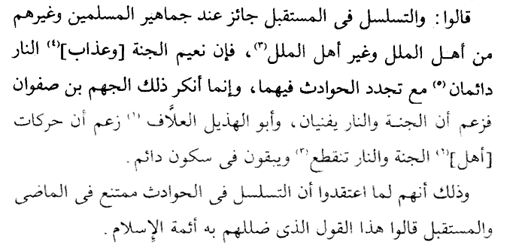IbnTaymiyyah.Com
Posted by Abu.Iyaad on Tuesday, August, 16 2011 and filed under Doubts and Misconceptions
Key topics: Hellfire

The Saying that the Hellfire is Eternal Is Plentiful and Abundant in the Works of Ibn Taymiyyah and He Refutes the Contrary View
Another example of that is the saying of Shaykh al-Islaam Ibn Taymiyyah (Minhaj al-Sunnah, tahqiq Muhammad Rashad Salim, 1/146):

They said: [The occurrence of] an endless chain of events in the future is permitted in the view of the majority of the Muslims and [in the view of ]others from the people of other religions and [in the view of] other than the people of religion. For the bliss of Paradise and the punishment of the Hellfire are permanent (eternal) alongside the reccurrence (renewal) of events therein. But that was rejected by al-Jahm bin Safwan who claimed that Paradise and Hellfire will [cease and] perish, and Abu Hudhayl al-Allaaf claimed that the movements of the inhabitants of Paradise and Hellfire will be cut off (and expire), and they will remain in eternal rest (sukun, absence of motion). This is because when they believed that an endless chain of events is impossible in the past and the future, they expressed this saying on account of which the leading scholars of Islaam declared them misguided.
Comments
This is very clear and explicit in that Ibn Taymiyyah, along with the Muslim majority and the leading Imaams of the religion, holds belief in the eternity of Paradise and Hellfire, and this establishes that any other claim is simply from the wishful thinking and the lies of the Sufi saint-worshippers who wish to tarnish the reputation of Ibn Taymiyyah because he - after the Ummah passing through centuries of drifting away from the way of the Salaf - Ibn Taymiyyah supported the way of the Salaf, promoted it and brought back the connection between it and the Ummah. Naturally, when a people build a paradigm, and schools of thought and doctrines and creeds that clash with the way of the Salaf, this will bring animosity and hatred towards anyone who challenges that paradigm and this is what happened to Ibn Taymiyyah, as is alluded to by Imaam al-Dhahabi in his biographical accounts (refer to the downloadable PDF in this article for the relevant citations and discussion of the matter).